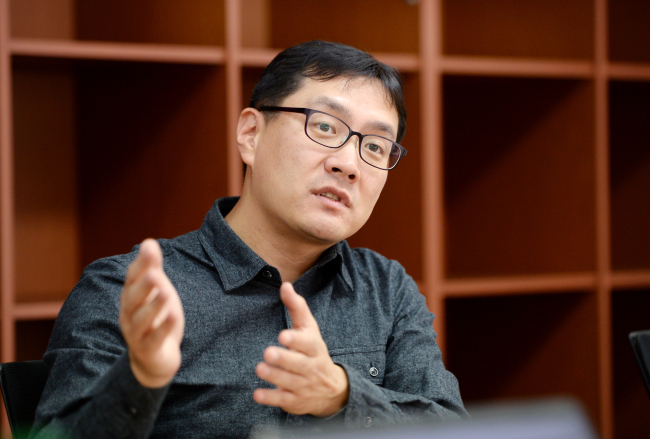In order to acquire investment, it is crucial for startups not only to convince the potential investor, “why this specific business model will work right,” but also to display an insight as to “why similar attempts have not succeeded in the past,” advised a renowned entrepreneur-turned-investor.
“Startups often tend to be so immersed in their innovative ideas and visions for the future that they may at times miss out on the history of their given sector,” Simon Seok-heun Kang, CEO and partner of venture capital firm Bon Angels, told The Korea Herald in an interview.
Bon Angels, the nation’s first VC to start off as a limited partnership format, currently operates a total of 30.5 billion won ($28 million) in funds, clinching two investment deals on average per month.
One of its latest investment targets was a shared economy platform for a babysitting service.
“Of course, the business model in itself wasn’t new, but what the company did was to analyze the problems faced by other predecessors in the past and to offer an alternative solution,” Kang said.
 |
Simon Seok-heun Kang, CEO and partner of venture capital Bon Angels. (Park Hyun-koo/The Korea Herald) |
Bon Angels, which celebrated its tenth anniversary last year, has so far invested in about 130 early-stage startups. Its most recognized investments include Woowa Brothers, operator of the nation’s largest food delivery application Baedal Minjok, and Ginno Games, the maker of Tera which was later acquired by Bluehole Studio.
It is especially marked for making a rare case of operating a 100 percent private investment fund with no government money involved whatsoever.
“Avoiding government funds is not easy in Korea as the state has always been the top player when it comes to early-stage investment,” the CEO said.
The South Korean government is currently planning to inject some 10 trillion won into fostering startups in artificial intelligence and big data.
“But state funds, despite all their merits, is taxpayers’ money which prioritize use for public benefit,” he said.
“It is eventually the private sector which has to take the lead, especially in mergers and acquisitions.”
Realizing how rare and challenging it is to operate a purely private venture capital fund here, Bon Angels decided to keep things that way and to set a model example in the industry, Kang added.
“It wasn’t exactly our intention from the very start to keep clear of government funds but now that we pioneered that path, we somehow felt a sense of responsibility to make this model successful.”
Another key feature of Bon Angels is that all of its partners are former or current entrepreneurs, in contrast with other venture capitalists who mostly come from financial backgrounds.
“Our experience in the field creates an empathy with the startups in which we invest,” he said.
“I believe that this is the virtuous circle in the startup-VC relationship. Those who were once entrepreneurs successfully induce investment, sell off their business and later become investors themselves.”
The VC is now set for its overseas expansion, with its focus on the Southeast Asian region.
“We have already invested in four startups in Vietnam, three in India, three in Indonesia and are considering investing in startups in the Philippines, Malaysia, Singapore and Thailand,“ Kang said.
Southeast Asian states, besides their huge population and relatively steady economic growth, also offer more room for innovative new businesses compared to Northeast Asian countries such as South Korea and Japan, according to the venture capitalist.
”We may also act as a networking platform for Southeast Asian local startups that wish to set foot into the Korean market and access its advanced information technologies.“
By Bae Hyun-jung (
tellme@heraldcorp.com)
The Korea Herald is publishing a series of articles looking into new roles of South Korean startups en route to the “fourth industrial revolution,” as well as their challenges in securing funds, entering the market and staying in it. This is the fourth installment. -- Ed.





![[Exclusive] Hyundai Mobis eyes closer ties with BYD](http://res.heraldm.com/phpwas/restmb_idxmake.php?idx=644&simg=/content/image/2024/11/25/20241125050044_0.jpg)
![[Herald Review] 'Gangnam B-Side' combines social realism with masterful suspense, performance](http://res.heraldm.com/phpwas/restmb_idxmake.php?idx=644&simg=/content/image/2024/11/25/20241125050072_0.jpg)

